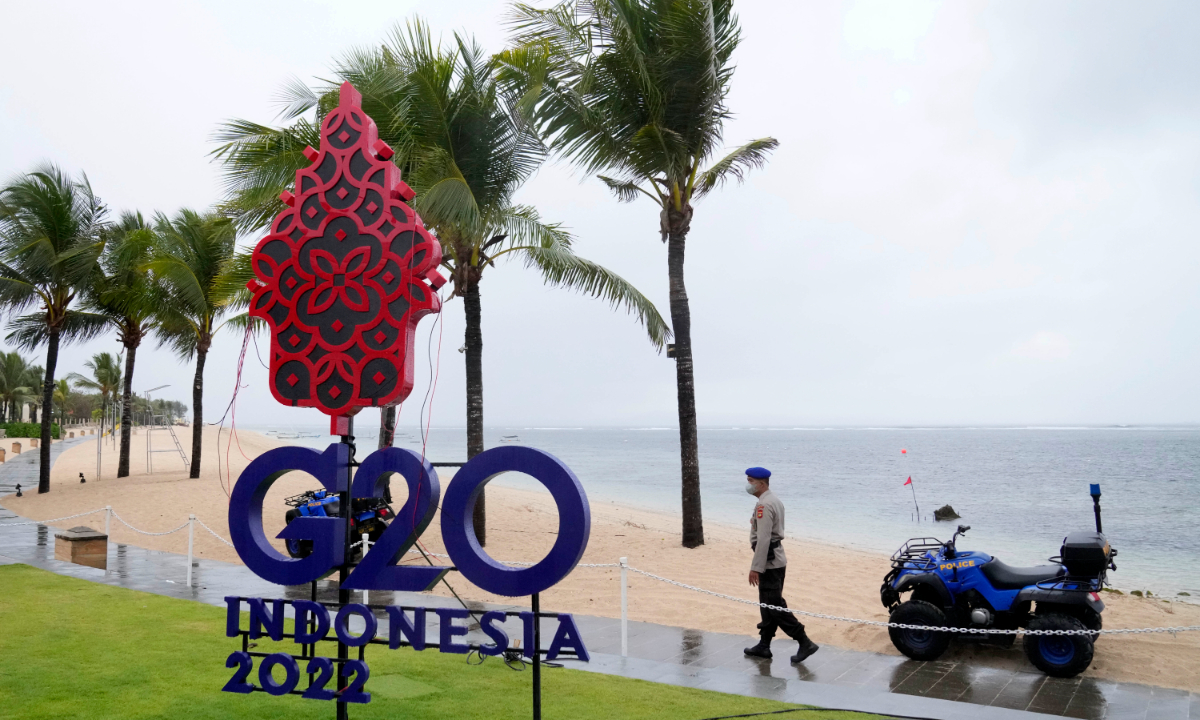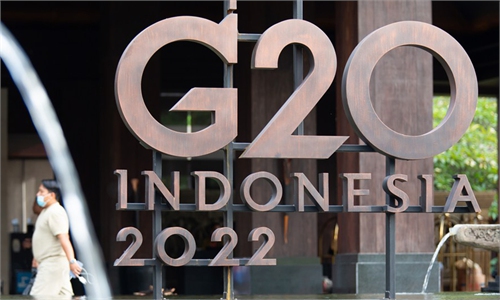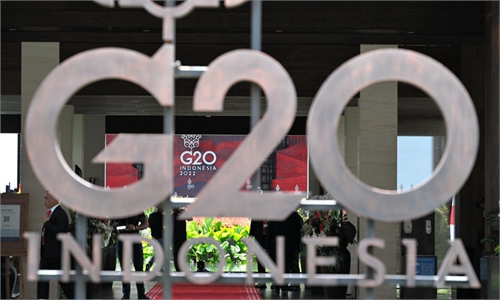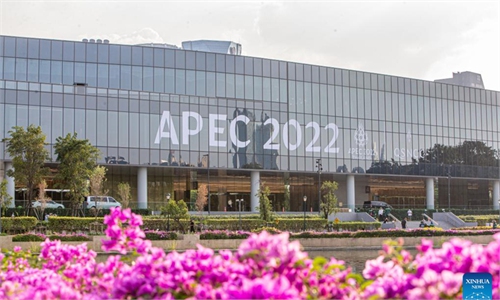
A police officer walks past a G20 sign in Nusa Dua, Bali, Indonesia, Thursday, July 7, 2022. Foreign ministers from the Group of 20 leading rich and developing nations are gathering in Indonesia's resort island of Bali for talks. Photo: VCG?
The Jakarta Post, the main English-language daily in Indonesia, which holds the G20 presidency this year, made a sincere appeal to world leaders on Monday: "Please don't come to Bali just to quarrel." In an article written by Kornelius Purba, its managing editor, the newspaper added that "Indonesian people, and global citizens, hope the leaders refrain from using the precious moments during the summit simply as opportunities to criticize and attack one another."Such a direct appeal underscores the tremendous difficulties and complexities faced by Indonesia in hosting the upcoming G20 leaders' summit, which is scheduled for November 15-16 in the Indonesian resort island of Bali. As Indonesia's Foreign Minister Retno Marsudi put it in a recent interview with Reuters, this could be "among the or maybe the most difficult of all G20s because of geopolitical and economic issues, and others."
Certainly, there is a litany of troubles facing the world - ranging from the looming risk of a global recession and the lingering COVID-19 pandemic to rising geopolitical tensions in flash spots across the world. These are the top priority issues for the G20 leaders to address at the Bali summit. But that's not why the summit will be challenging, because after all the G20 was first created for world major economies to coordinate policies to tackle global issues. The real reason why the summit may be difficult is the geopolitical tricks pulled by politicians from Washington and some of their allies at these crucial meetings, which seriously disrupts the order of these meetings and effectively prevents them from producing any meaningful results.
That is not an assumption. It actually happened just a few months ago. During the G20 foreign ministers' meeting in Bali in July, the US and some other Western officials in an apparently concerted effort tried to hijack the meeting to air their grievances over the Russia-Ukraine conflict. As a result, the meeting did not produce a joint communique. The foreign ministers did not even pose for a group photo. Such has been the case for several other G20 meetings so far this year. At a G20 finance ministers' meeting in April, the US, the UK and Canadian officials staged a coordinated walkout of a G20 meeting as Russian delegates spoke.
It's not surprising Indonesian officials and the media regard this as a difficult G20 meeting. If the foreign ministers' meeting in July is a harbinger of what could play out at the upcoming G20 summit, it will not bode well for any party. While there are more preparations underway for the leaders' summit and such a high-level meeting is highly unlikely to see the types of drama we saw out in the open during previous meetings, there are still worrying signs coming from Washington.
As in previous meetings, US officials have made it clear that they will focus on the Russia-Ukraine conflict - or more precisely focus on using the platform to pressure other countries to join its reckless involvement in the conflict though sweeping economic sanctions against Russia. In announcing US President Joe Biden's attendance at the summit, the White House said that Biden will focus on, among other issues, "the global impact of Putin's war on Ukraine."
The US and some of its allies are actively pushing for the G20 to condemn and even exclude Russia, even though analysts warned that that would only further intensify tension. Talking about US Treasury Secretary Janet Yellen's upcoming trip to India, which will assume the G20 presidency next year, and to Bali for the summit, a Treasury official said on Friday that "the G20 will need to address and clearly highlight Russia's culpability for the war and the fallout," according to Reuters.
Certainly, discussions should be held on the Russia-Ukraine conflict with the aim of finding a diplomatic solution, but it should not be dominated by the US' confrontational approach. If Washington truly wants to address negative effects on the world economy, what about its culpability for causing unprecedented disruptions to global trade and industrial and supply chains with reckless economic sanctions against other countries and irresponsible monetary policies that hurt other economies? US officials are known for their hypocrisy and double standards, but there should be a bottom line as to what it can do on international multilateral platforms like the G20.
For the people of the world, including Americans, we cannot afford for the G20 to be hijacked by the US to advocate for economic decoupling and geopolitical bloc confrontation, because the G20 is a rare platform on which major economies can coordinate policies and come up with actual solutions to at least help ease some of acute problems facing the world. And there are acute problems. The IMF in October warned the global economy was headed for "stormy waters" and "the worst is yet to come," adding that aggressive interest rate increases could spur a harsh global recession. In addition, the world is mired in profound shortages of energy and food. Many major economies are facing sky high inflation. And many emerging market economies are struggling with debt repayments.
All of these problems demand a unified response from the world's biggest economies, namely the G20. And past experiences show that if all the countries are pulling in the same direction, they can actually tackle the problems and save the world from plunging into a recession. In 2008, amid the severe global financial crisis, the first G20 summit was convened in Washington DC, where the world leaders came up with what has been widely seen as the largest and most coordinated fiscal and monetary stimulus ever undertaken, which succeeded in averting the risk of an economic depression.
In some ways, the troubles today exceed those of the global financial crisis, but humans, when united, can overcome these dark times. What's worrisome is that some unhinged Western politicians, whose irresponsibility and recklessness in pursuit of self-interest have plunged their countries into disarray over the years, might seek to export those toxic impulses to the global stage. The upside is that many countries are still devoted to multilateralism and decent policymaking.
Indonesia, as the host nation, is certainly an example. The country, under the leadership of President Joko Widodo, is doing all it can to ensure a successful summit. Indonesia has also put forward many initiatives to tackle global problems in areas such as the economy and healthcare. For the US and other Western officials who have been invited to attend the G20, the least they can do is to show some respect for the host nation and actually pull up their sleeves and get to work, rather than starting pointless quarrels.
The author is an editor with the Global Times. bizopinion@globaltimes.com.cn




